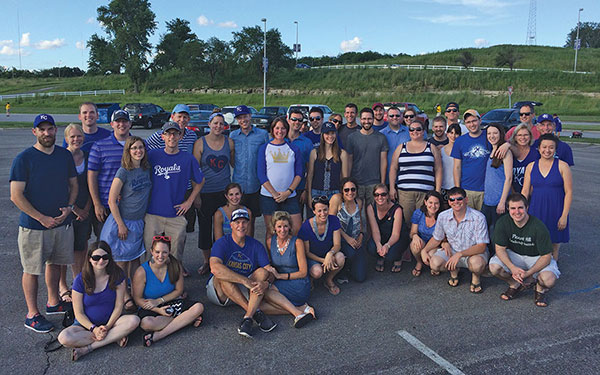 |
| Christ Community Church pastoral residents and spouses at a July 2015 reunion.
Courtesy Christ Community Church |
Sometimes it seems as if there’s an ever-widening fracture in the collaborative endeavors of seminaries and churches. Some pastors, questioning the effectiveness of academic preparation, have begun creating their own pathways for leadership development. On the other hand, some seminary leaders see the church as uninterested in leadership formation. Seminary leaders may even view the church as a competitor for resources or for students.
Could it be that the fracture between the church and the academy has left both important institutions recognizing that something’s not right, but uncertain of what to do next? How should they work together in the important task of forming future pastors?
Our congregation, Christ Community Church, believes that seminaries and congregations should work together rather than glare at one another across an ivy-covered divide. Since we believe so deeply in shaping the next generation of pastoral leaders, we have had a pastoral residency program at our church for the last 12 years. Our model has been to work closely with recent seminary graduates who are hired onto our staff for a two-year period.
The easiest way to explain the work we are doing is by comparing it to that of a teaching hospital. After long years of graduate education, physicians in training do a residency in a real hospital, taking care of real patients, learning on the job. Similarly, we think that preparation for pastoral ministry should include both a robust seminary education and an extended period of pastoral work in a congregational setting.
Pastoral residents are immersed in the life of the church and given hands-on experience while being mentored by seasoned pastors and peers. The residents take on two roles: pastor and pastor-in-training. An Alban Institute report, Becoming a Pastor: Reflections on the Transition into Ministry, describes the dual role this way:
The new pastor takes on the pastoral authority that is conferred by the congregation and/or denomination and, at the same time, enters into a shared understanding with the congregation that he or she is a pastoral apprentice-in-residence. This duality provides an ideal setting for the formation of a pastoral identity. By providing a calibrated, graduated, reflective initiation into the pastoral life and the pastoral office, assuming the role of being a pastor is integrated with the emerging experience of becoming a pastor. One moves from “role play” to “role ownership” and identification (p. 27).
Over the last 12 years, Christ Community Church has seen 23 residents complete the two-year residency program, and four more are currently in the program. Seventeen of the 23 are now pastors, and the other six are serving the Church through other organizations. Jeff Knitt completed our residency program in 2010 and was recently named lead pastor at Crossview Church in DeKalb, Illinois. In an email conversation about his new role, he told us how significant the residency has been to him in his transition. Here’s what he wrote:
As I read through the Gospels, I can’t help but notice how the greatest learning moments for the disciples were when they failed. Needless to say, in seminary, failing is not really the best option. The residency provided me freedom and opportunities to fail without hurting the church. The residency allowed me to connect the theoretical and theological with the day-to-day practical, and I feel like I’m better equipped to love and serve our church family because of that.
A pastoral residency requires commitment but need not be complicated. It simply requires a congregation to hire a young, often inexperienced team member to the staff and commit the congregation’s resources, including the time of more seasoned pastoral leaders, to mentor and train the new resident. As they work together, experienced pastors take time to reflect with the residents on the work they are doing.
Jeff Knitt wrote about those moments in this way:
I am most thankful for the early experience of serving at a church with pastors who are a little ahead of me on the journey and who want to live like Jesus. Serving at a church will always provide questions and challenges that no one anticipated, so starting my ministry as a resident and watching other pastors navigate those issues, trying to love people the same way Jesus would, gave me a long-term vision for pastoral health in ministry that I’ve never forgotten.
Christ Community is not the only congregation that’s helping to nurture young pastoral leaders. We’re committed to collaborating with other congregations that have the same vision, and we want to help churches create and sustain pastoral residency programs.
The way we’re doing that now is through an organization called Made to Flourish, which we helped establish in 2015 with the partnership of the Kern Family Foundation. The principal mission of Made to Flourish is to promote the integration of faith and work — to provide resources for pastors as they help Christians live their lives as integrated wholes, faithful on Sundays and faithful at work throughout the week.
The new Made to Flourish pastoral residency program builds on this idea of integration. The residency program is a church-based, two-year program for seminary graduates or current students. It asks that a participating church pay the resident a salary and benefits comparable to other entry-level pastoral staff and that the residents, along with the other pastoral leaders, participate in Made to Flourish programs that promote faith-work integration.
We believe that assisting churches in developing the next generation of pastoral leaders who know how to connect faith and work is an important long-term investment of Made to Flourish. The organization hosts networks of participating pastors in 18 cities. The interaction at the local level is a great way for pastors to learn from one another — including how to mentor and train ministry residents.
With the partnership of seminaries, we’ve committed ourselves to shaping leaders to tend, care for, and lead congregations in the years ahead. We’re convinced that as God continues to build his church, we can do our small part to lead churches that produce human flourishing for the common good.

A nationwide network
Founded in 2015, Made to Flourish exists to equip pastors to forge a more integral connection between Sunday faith and Monday work. The organization provides training, conferences, articles, videos, and other resources. As pastors learn how to connect faith, work, and economics, they can help their congregations live for Christ in all areas of life and advance the common good.
Made to Flourish is based in Kansas City and has directors in 18 cities across the country. There’s no fee to join. The organization is funded through grants and gifts.
More information: www.madetoflourish.org.




























